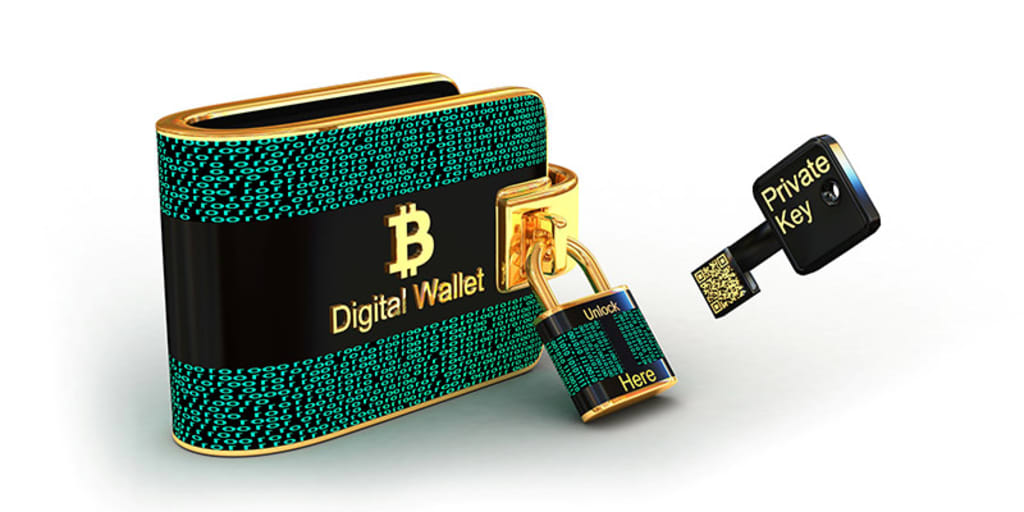Crypto Wallet Guide: Must-Known Things For beginners
Go through this detailed crypto wallet guide to know more about the hardware and software crypto wallets.

What are hardware and software crypto wallets?
Hardware Wallets: Hardware wallets are physical devices specifically designed to store cryptocurrency private keys offline. They provide an extra layer of security by keeping the private keys isolated from internet-connected devices. Hardware wallets are typically small, USB-like devices that have their own screen and buttons for transaction verification. They generate and store private keys securely within the device and require the user to physically connect the wallet to a computer or mobile device when they want to initiate a transaction. Examples of popular hardware wallets include Ledger Nano S, Trezor, and KeepKey.
Software Wallets: Software wallets, also known as digital wallets or hot wallets, are applications or programs that run on computers, smartphones, or other electronic devices. They store the private keys electronically within the device’s storage or on a remote server. Software wallets are connected to the internet, allowing users to easily send and receive cryptocurrencies. They come in various forms such as desktop wallets, mobile wallets, and online wallets. It’s important to note that regardless of the type of wallet used, users should prioritize security practices such as enabling two-factor authentication, using strong passwords, and keeping their wallet software up to date to safeguard their cryptocurrency holdings.
Hardware crypto wallets: Pros and Cons
Hardware crypto wallets offer several advantages and disadvantages. Let’s explore the pros and cons of using hardware wallets for storing and managing cryptocurrencies:
Pros of Hardware Crypto Wallets:
Enhanced Security: Hardware wallets are considered one of the most secure options for storing cryptocurrencies. They store private keys offline, making them immune to online threats such as hacking, malware, and phishing attacks. Private keys never leave the device, reducing the risk of exposure.
Cold Storage: Hardware wallets use a concept called “cold storage” as they store private keys offline. This isolation from internet-connected devices adds an extra layer of protection against potential attacks, as hackers cannot access the private keys remotely.
Transaction Verification: Hardware wallets have built-in screens that display transaction details. Users can verify and approve transactions directly on the device, ensuring that they are sending funds to the correct recipient and confirming the transaction’s details before signing.
Multi-Currency Support: Most hardware wallets support multiple cryptocurrencies, allowing users to store and manage different digital assets within a single device. This convenience is useful for individuals holding various cryptocurrencies.
Backup and Recovery Options: Hardware wallets often provide backup and recovery options. Users are typically provided with a recovery seed or mnemonic phrase that can be used to restore access to their funds in case the wallet is lost, stolen, or damaged.
Cons of Hardware Crypto Wallets:
Cost: Hardware wallets come with a price tag. While the cost varies depending on the brand and model, hardware wallets are generally more expensive compared to software wallets, which are often free to use.
Physical Dependence: As hardware wallets are physical devices, users need to have the wallet with them whenever they want to access or transact with their cryptocurrencies. This can be inconvenient for individuals who frequently need to access their funds while on the go.
Learning Curve: Hardware wallets may have a learning curve for individuals who are new to cryptocurrency and digital wallets. Setting up the wallet, understanding its features, and properly managing the recovery seed might require some technical knowledge and understanding.
Vulnerability to Physical Damage or Loss: Since hardware wallets are physical objects, they are susceptible to loss, damage, or theft. If a hardware wallet is lost or damaged without a proper backup, the funds stored within it could be irretrievable. Despite these drawbacks, hardware wallets remain one of the most recommended options for individuals seeking a high level of security and control over their cryptocurrency holdings.
Security Features of Hardware Wallet
Hardware wallets offer several security features that contribute to their high level of security. Here are some key security features typically found in hardware crypto wallets:
Private Key Isolation: Hardware wallets store private keys offline, isolating them from internet-connected devices. This prevents exposure of the private keys to potential online threats, such as malware or hacking attempts.
Secure Element: Hardware wallets often include a secure element chip, which is a tamper-resistant component designed to securely generate and store private keys. This chip provides an added layer of protection against physical attacks and unauthorized access attempts.
Transaction Verification: Hardware wallets have built-in screens that display transaction details, including the recipient’s address and the amount being sent. Users can review and verify these details directly on the device before approving the transaction. This feature ensures that users have full control over the transaction and can confirm its accuracy before signing.
PIN Code Protection: Hardware wallets typically require users to set up a PIN code as an additional layer of security. The PIN code is used to unlock the device and access the wallet’s functions. The PIN code acts as a barrier against unauthorized access if the device is lost or stolen.
Two-Factor Authentication (2FA): Some hardware wallets support 2FA, which adds an extra layer of security during the device’s setup or transaction verification process. 2FA typically involves using a secondary device, such as a smartphone, to confirm actions or transactions on the hardware wallet. Limited Attack Surface, Backup & Recovery Options, and Firmware Updates are a few more security features of a Hardware wallet. It’s crucial for users to follow the manufacturer’s instructions, secure their hardware wallet physically, and use strong PIN codes and recovery seed practices to maintain the highest level of security for their cryptocurrencies.
Software crypto wallets: Pros and Cons
Software crypto wallets, also known as digital wallets or hot wallets, offer certain advantages and disadvantages. Let’s explore the pros and cons of using software wallets for storing and managing cryptocurrencies:
Pros of Software Crypto Wallets:
Accessibility and Convenience: Software wallets are generally easy to set up and use, making them accessible to a wide range of users. They are available as applications for desktop computers, smartphones, and web-based platforms, allowing users to access their cryptocurrencies from various devices with internet connectivity.
Cost: Many software wallets are available for free, making them a cost-effective option for storing and managing cryptocurrencies. Users can download and use software wallets without incurring additional expenses.
Multi-Currency Support: Software wallets often support a wide range of cryptocurrencies, providing users with the flexibility to store and manage different digital assets within a single wallet. This convenience is particularly useful for individuals holding diverse cryptocurrency portfolios.
User-Friendly Interfaces: Software wallets typically offer intuitive and user-friendly interfaces, making it easier for users to navigate and interact with their cryptocurrency holdings. They often provide features such as transaction history, address book, and balance tracking, enhancing the overall user experience.
Enhanced Functionality: Some software wallets integrate additional features and services, such as decentralized application (dApp) browsers or direct integration with cryptocurrency exchanges. This allows users to interact with decentralized applications and participate in specific blockchain networks directly from their wallets, offering enhanced functionality.
Cons of Software Crypto Wallets:
Security Risks: Compared to hardware wallets, software wallets are generally considered less secure due to their online connectivity. Software wallets store private keys electronically, either on the device itself or on a remote server, increasing the risk of exposure to online threats such as hacking, malware, and phishing attacks. Vulnerabilities in the operating system or application can also pose security risks.
Dependency on Devices and Internet: Software wallets are reliant on electronic devices and internet connectivity. Users need to ensure that their devices are secure and protected from malware or keyloggers. The wallets can be vulnerable to hacking attempts if the device or network is compromised.
Privacy Concerns: Some software wallets require users to provide personal information during the registration or verification process. This can raise privacy concerns, especially if the wallet provider lacks transparent privacy policies or has inadequate security measures in place.
Centralized Control: Certain software wallets are custodial, meaning that the private keys are stored on a remote server managed by a third party. While custodial wallets may offer additional convenience, they involve an element of trust in the wallet provider, as they have control over the private keys. This centralization raises concerns about potential hacking or data breaches.
Software Vulnerabilities: Software wallets are subject to potential bugs, vulnerabilities, or software flaws that could be exploited by attackers. Although wallet developers release updates and security patches, users must ensure they keep their software wallets up to date to mitigate these risks.
Security Features of Software Wallet
Software wallets implement various security features to protect users’ cryptocurrency holdings. Here are some common security features found in software crypto wallets:
Encryption: Software wallets use encryption algorithms to secure private keys and other sensitive data stored on the device or server. Encryption helps prevent unauthorized access to the wallet and ensures that the private keys are securely stored and transmitted.
Password Protection: Software wallets typically require users to set up a password or passphrase to access the wallet. A strong password adds an extra layer of security and helps prevent unauthorized access to the wallet and its funds.
Two-Factor Authentication (2FA): Many software wallets support 2FA, which adds an additional layer of security during the login or transaction verification process. This feature requires users to provide a second form of verification, such as a code sent to their mobile device or generated by an authentication app, to confirm their identity.
Hierarchical Deterministic (HD) Wallets: Some software wallets implement HD wallet technology, which generates a unique seed or mnemonic phrase during the wallet creation process. This seed can be used to restore the wallet and access funds in case the device is lost or damaged. HD wallets also enable the generation of multiple public and private key pairs from a single seed, enhancing security and convenience.
Secure Codebase: Wallet developers often follow best practices for secure coding to minimize vulnerabilities. Regular code audits, security testing, and updates are performed to address any identified vulnerabilities and ensure the wallet’s security remains robust. While software wallets offer convenience and accessibility, it’s important for users to maintain good security practices such as using strong passwords, enabling 2FA, keeping the wallet software up to date, and being cautious of phishing attempts or malicious software that could compromise the security of their software wallet.
Finally White-label crypto wallet
A white-label crypto wallet is a pre-built software or hardware solution developed by a company that can be rebranded and customized by other businesses or individuals to launch their own branded cryptocurrency wallet. In the context of software wallets, businesses can license the software and modify the user interface, add custom features, and tailor it to their specific requirements.
This allows them to enter the cryptocurrency market quickly and provide their customers with a branded wallet solution without investing significant time and resources in developing a wallet from scratch. White-label crypto wallets offer convenience, speed, and the ability to differentiate in the market. However, it’s essential for businesses to choose a reputable web3 development agency and ensure the underlying software or hardware maintains a high level of security and reliability.
About the Creator
Lucas Andrew
Blockchain analyst and technical writer.






Comments
There are no comments for this story
Be the first to respond and start the conversation.